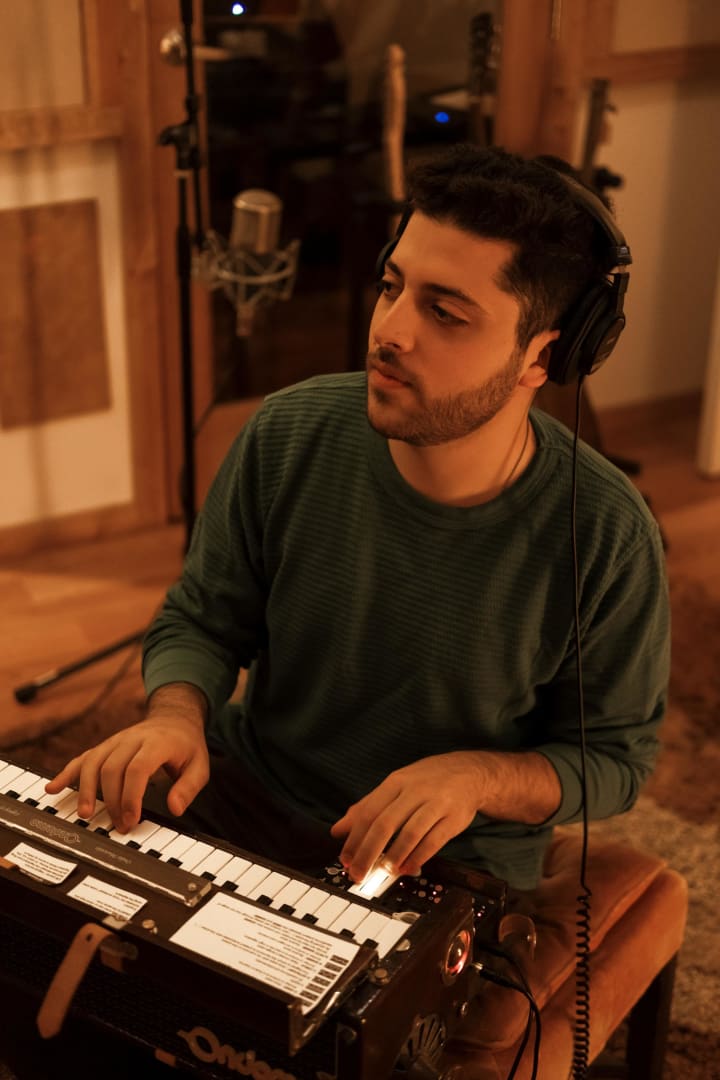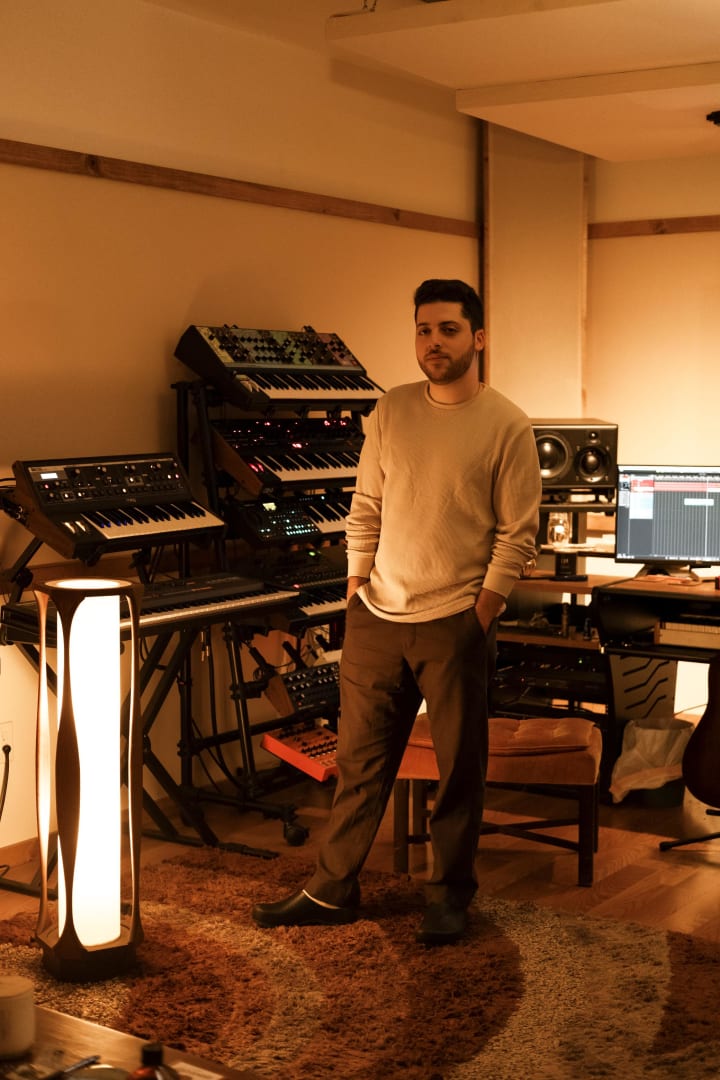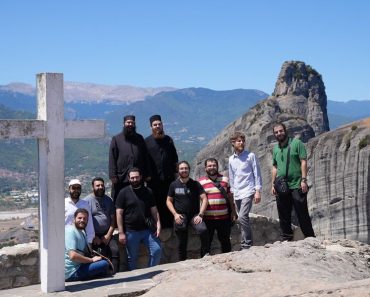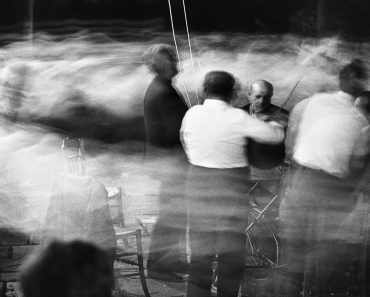In film and television, where auditory landscapes are as crucial as visual storytelling, a new generation of musicians and composers is making its indelible mark.
Among them is Nissan Zangilevitch, a Los Angeles-based musician and composer whose recent contributions to high-profile projects, including the 2024 Amazon Prime Video hit “Killer Heat,” global branding campaigns with industry-leading brands such as Google and Deloitte, and upcoming features from major studios, underscore his growing influence and versatile talent.
His journey from a Berklee College of Music graduate to a sought-after collaborator with industry veterans like Remote Control Productions, Joseph Shirley and Ramin Djawadi paints a portrait of dedication, innovation, and a profound understanding of music’s power in narrative.
Zangilevitch’s foundational training at Berklee College of Music, where he earned a Bachelor of Music in Film Scoring magna cum laude, provided him with a robust theoretical and practical toolkit. His early career quickly immersed him in the industry’s elite echelons, serving as a composer for Joseph Shirley and a musician at Remote Control Productions.
A particularly notable early experience included his role as Tech Engineer to acclaimed composer Ramin Djawadi for the world-renowned “Game of Thrones Live Concert Experience” production at the Hollywood Bowl, a project that undoubtedly offered invaluable exposure to large-scale, high-stakes musical events. Beyond these roles, Zangilevitch is also known for creating bespoke Kontakt instruments, a testament to his technical prowess and innovative approach to sound design for fellow composers.
Zangilevitch’s most recent success came with “Frank and 3”, the critically acclaimed feature film that has been selected for Cannes Film Festival, Mammoth Film Festival, Los Angeles Film Festival, Beverly Hills film festival, and many more; and the 2024 American neo-noir mystery film “Killer Heat,” which premiered on Amazon Prime Video last fall. The latter of which, directed by Philippe Lacôte and starring Joseph Gordon-Levitt, Shailene Woodley, and Richard Madden, quickly ascended to the #1 movie spot on Prime Video shortly after its release, and #2 in the US. The film is based on Jo Nesbø’s short story “The Jealousy Man,” and follows a private investigator probing a suspicious death on the Greek island of Crete. For the soundtrack, Zangilevitch worked closely with composer Joseph Shirley on the film’s music, contributing in various capacities, from meticulously building unique sounds derived from recordings of traditional Greek instruments to preparing the musical cues.

Reflecting on his approach to composing, particularly for a project like “Killer Heat” that demands a precise emotional and atmospheric touch, Zangilevitch shared insights into his creative process. “It all starts at the spotting session, where we get to watch the movie’s latest cut with the director and music team members,” he explained. “That’s where a lot of the big decisions about what scenes should have music are made.”
Once the broad strokes are defined, the detailed work begins. “When it comes to writing the music itself, it really depends on the nature of the scene,” he elaborated. “If it’s an action scene, then the movement on screen is really important to follow. In the case of it being a more emotional scene, then I would try to frame it more around any important dialogue, and natural beats of the scene. It’s about understanding the core functionality of the music in a particular scene and then structuring the music around that.” This adaptive methodology ensures that the score functions as an organic extension of the narrative, serving the film’s specific needs rather than adhering to a rigid template.
Working on a film that reaches such a wide audience on a major platform like Amazon Prime Video also provided Zangilevitch with invaluable experience in studio collaboration. “Working with the big film studios is pretty wild and super exciting, especially since you get to work with so many people on a single project!” he noted. He emphasized the criticality of communication in such environments: “I’ve learned how crucial it is to talk things out clearly with everyone involved – constantly, to make sure we’re all on the same page about the music.” The high standards are also a significant driver. “They also expect everything to be super precise and polished, which pushes you to step up your game creatively and technically,” he added. Despite the rigorous demands, the reward is substantial. “Honestly, seeing your score presented on such a massive scale, knowing so many people will experience it, is an incredibly rewarding and humbling aspect of the job.”
Looking ahead, Zangilevitch’s impressive slate of upcoming projects further solidifies his standing in the industry. He is currently engrossed in the musical production for “Is God Is,” an Amazon MGM Orion Pictures film adaptation of Alesha Harris’s award-winning off-Broadway play. This highly anticipated project features a stellar cast including Kara Young, Mallori Johnson, Sterling K. Brown, Vivica A. Fox, and Janelle Monáe. Zangilevitch is working on the score alongside Joseph Shirley, with production beginning in 2024 and the release date still to be announced.
Shedding some light on this intriguing project, Zangilevitch expressed particular excitement for a unique sonic element. “Joe and I have been working on writing the score for the movie adaptation of ‘Is God Is,’ and it’s shaping up to be an incredible project,” he said. “I can’t say much – but I think the element that excites me the most are the vocals we’ve tracked, as we’ve sampled and processed them to make some really cool and entrancing sounds for the film. I always enjoy the sound design element of working on a new project, where I get to explore the sonic landscape of the project, and find creative ways to integrate stimulating sounds.”
Another major project on Zangilevitch’s horizon is “Gabby’s Dollhouse: The Movie,” a musical fantasy comedy from DreamWorks Animation and Universal Pictures, set to hit US theaters on September 26, 2025. Based on the popular Netflix series, the film combines live-action and animation, featuring returning cast members like Laila Lockhart Kraner alongside new additions such as Ego Nwodim, Kyle Mooney, Melissa Villaseñor, and music luminaries like Gloria Estefan and Mimi Webb. Zangilevitch is specifically focused on song production for this movie, again collaborating with Joseph Shirley.

Describing his work on “Gabby’s Dollhouse: The Movie,” Zangilevitch highlighted a dynamic and collaborative process. “I’m currently working on the film’s songs with Joe, and our collaboration is a very dynamic, hands-on process,” he said. “After he starts production on a song, I step in to add elements like synth layers, and percussion. All the while trying to maintain a driving momentum to the song by ensuring it had the right groove and emotional impact.”
Zanglievitch’s contributions extended beyond mere additions. “I also got the chance to create instrumental versions of some songs for usage in different parts of the movie, meticulously re-arranging elements so they could stand alone,” he said. “Seeing these songs come to life on screen is incredibly rewarding – I’m very excited for people to check it out once it comes out later this year.”
Beyond the specifics of individual projects, Zangilevitch articulated his general philosophy for working with film directors, underscoring the inherently collaborative nature of the role. “Working with a film director on a score is an incredibly collaborative and iterative process,” he explained. “It begins by diving deep into their vision for the film; understanding their emotional goals and themes. Then, during the spotting session, we pinpoint where music should start and stop, and what emotional purpose each cue serves.”
This foundation leads to a continuous refinement cycle. “After composing initial demos, a continuous feedback loop with the director allows me to refine the music until it perfectly aligns with their vision. This partnership continues through recording and mixing, ensuring the score becomes an indispensable part of the storytelling. It’s a constant conversation that truly brings the film to life.”
When asked about his favorite musical instrument, Zangilevitch, a drummer since childhood, declares the drums as his choice. “They’re the heartbeat of any track, driving the rhythm and setting the emotional pulse with incredible versatility, from thunderous impacts to delicate shimmers,” he said. “They make you feel the music and groove in your bones.”
He also shed light on the unsung hero of musical production: post-production. “When recording things like live drums, post-production is crucial for smoothing everything out. That’s where you can use tools like EQ to shape the tone, compression for punch and consistency, and reverb and delay to create realistic spaces. This process refines the raw recordings into a cohesive, impactful, and perfectly balanced element of the final score, ensuring the drums hit just right.”
The depth of understanding of both performance and technical refinement highlights the comprehensive skill set required in modern film scoring. In fact, Zangilevitch’s writing style is a testament to his broad musical palate. “My writing style draws heavily from a few key musical genres,” he noted. “I’m deeply inspired by jazz fusion, for their blend of complex harmonies, intricate rhythms, and strong grooves. World music also significantly influences me with its diverse instrumentation, scales, and rhythmic patterns.”
Interestingly, he also cited a less conventional source of inspiration: “I would also include a wide variety of video game music, as it also inspires my approach to dynamic storytelling and adaptable scores.” Despite these strong influences, Zangilevitch emphasized flexibility: “However, despite these influences, I always prioritize adapting my style to best serve the specific musical landscape and narrative of each project.”
Check out Nissan’s portfolio of work on IMDB.






